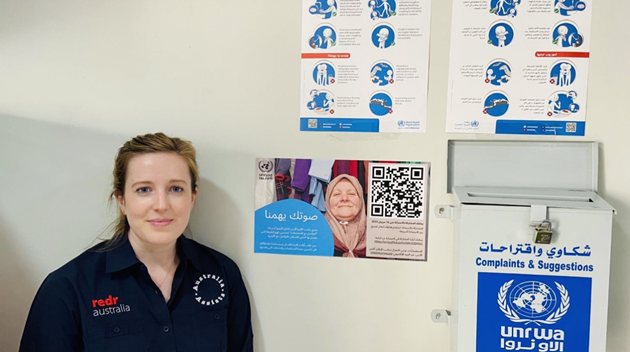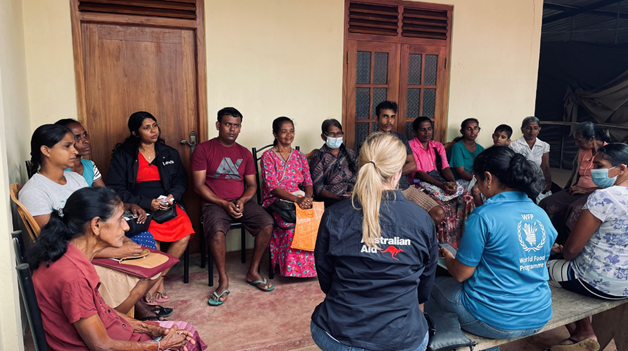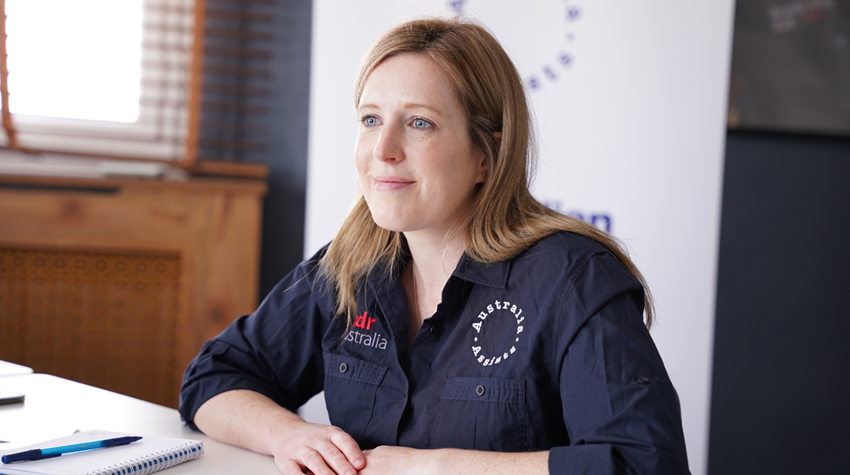Emma has deployed with the Australia Assists Program five times in the last four years. Emma’s roles have taken her from the Pacific to South Asia and the Middle East, covering diverse portfolios from humanitarian coordination to Accountability to Affected Populations and donor relations.
Currently deployed to the United Nations Population Fund (UNFPA) in Syria as a Reporting Analyst and Grants Manager, Emma was asked to reflect on her motivation to deploy through the Australia Assists Program. “The main reason I continue to undertake deployments is because there is so much need,” explains Emma. “I feel motivated to contribute and to assist in whatever very small way that I can.”
The Australia Assists Program, implemented by RedR Australia, is the Australian Government’s humanitarian civilian deployment program, and forms part of Australian Aid’s support for humanitarian action.
Emma’s motivation to serve people affected by crisis began at a young age.
“Growing up in New Zealand and Australia made me very grateful for the opportunities I was provided and gave me an appreciation of the fact that many people don't have access to the same kinds of opportunities I had available to me, simply by virtue of where they were born,” says Emma.
“After I finished my schooling, I began traveling overseas and exploring many different countries and these experiences really heightened my sense of social justice and drive to work in the humanitarian sector.”
The importance of trust
Emma’s first Australia Assists Program deployment in 2020 was as COVID-19 Coordinator with the United Nations Resident Coordinator’s Office (UNRCO) in the Pacific, working to provide specific support to Kiribati. In this role, Emma analysed the socio-economic impact of the COVID-19 pandemic in the Pacific to formulate policy recommendations for governments and development partners.
Moving to a regional position covering a portfolio including Kiribati, Nauru and Tonga, Emma developed a United Nations (UN) system-wide COVID-19 socio-economic response plan for the Pacific, ensuring that national response plans and development priorities were respected. In addition, Emma assisted in developing surveys, communications materials, and raising funds for much needed humanitarian assistance.
“Working in the humanitarian sector has really allowed me to develop and refine a lot of essential skills including teamwork, communication, leadership and problem-solving,” says Emma. “But one of the most important things I’ve learnt – both from colleagues and the communities I've served – is the importance of building trust.”
“Working to establish trust with colleagues and communities can improve opportunities for more effective coordination and collaboration and helps in calling out gaps or challenges and identifying solutions to improve the overall quality of the humanitarian response,” she explains. “It can be challenging to build trust when you're working in a new environment, particularly when being deployed for short periods of time such as three or six months. To do this effectively requires good listening skills, patience, and a strong sense of personal accountability so that people know they can rely on you and that you will follow through on your commitments.”
Being accountable to affected populations

Emma’s second deployment in early 2022 was as Program Officer with UNRWA in Jordan, where Emma helped the Programme Support Office to develop the Agency’s new strategic plan, making sure that the United Nations Sustainable Development Goals were well integrated. UNRWA is the United Nations Relief and Works Agency for Palestine Refugees in the Near East. As the Agency dedicated to providing assistance and protection for Palestinian refugees living in the region, Emma also worked to strengthen accountability towards Palestinian refugees and amplify their voice in decision-making. This focus on accountability to affected populations would become a thread throughout Emma’s future deployments.
To ensure that UNRWA better understood the needs of the Palestinian refugees they support, Emma launched a baseline mapping assessment and action plan, led consultations with communities, and designed mechanisms so that affected populations could communicate with service providers and provide feedback on their satisfaction with the quality of the assistance provided.
“At a policy level, UNRWA considers Accountability to Affected Populations a cornerstone of quality service provision to meet changing refugee needs and deliver more sustainable development outcomes,” says Emma. “The participation of Palestine refugees is one of the Agency's minimum protection standards, including the proactive involvement of more vulnerable groups, such as women, children, older people, and people with disabilities”.
Emma’s next deployment in late 2022 was with the United Nations Office for the Coordination of Humanitarian Affairs (OCHA) in Sri Lanka to support the humanitarian response. Sri Lanka was experiencing a multi-dimensional crisis, including food insecurity, healthcare shortages and increasing protection issues, such as increased rates of gender-based violence. Emma’s role was Accountability to Affected Populations and Prevention of Sexual Exploitation and Abuse Officer.
“I worked to ensure that affected populations have the information they need to access humanitarian assistance, and make decisions,” said Emma. “This includes ensuring that affected populations are included in needs assessments so that we can better understand their needs and priorities, along with how they prefer to communicate with humanitarian organisations. Integrating this information into tools, such as the revision of the Humanitarian Needs and Priorities Plan, guides humanitarian partners in their planning and programming, and can help to create a more effective response.” 
A large part of her role focused on convening the then-newly established Accountability to Affected Populations Working Group and the Prevention of Sexual Exploitation and Abuse Network, which includes members from United Nations agencies and non-governmental organisations (NGOs).
“I’m really passionate about advocating for local and national NGOs – I’m always looking for more ways to meaningfully engage them in humanitarian responses”, said Emma.
Emma’s work increased awareness on the risks of sexual exploitation and abuse during humanitarian responses among both humanitarian workers and affected populations. An important part of raising awareness was producing contextualised information, education and communication materials which were made available in local languages and distributed to humanitarian organisations.
“It is really important that affected populations can provide feedback on the nature and quality of humanitarian assistance they receive, and that they have avenues to report any potential concerns about the conduct of humanitarian workers, especially related to issues of sexual exploitation and abuse,” says Emma.
Emma then transitioned into another Australia Assists Program deployment in early 2023 as Accountability to Affected Populations Senior Specialist with OCHA in Pakistan to support the major humanitarian response to the monsoon floods.
Supporting efforts to ensure the humanitarian assistance being provided was appropriate, Emma coordinated with eight UN agencies and NGOs to facilitate 35 focus group discussions with more than 500 flood-affected people in ten districts across Baluchistan, Khyber Pakhtunkhwa, and Sindh Provinces. Using the key findings and recommendations from the focus group discussions, she then developed a Community Voices Bulletin which was translated into Urdu and Sindhi and facilitated an online webinar with over 60 participants from UN agencies and NGOs.
She then led two one-day Accountability to Affected Populations workshops in Islamabad and Sindh Province for around 90 participants from UN agencies and NGOs, along with community members from flood-affected areas.
Emma also led the 2022 Pakistan Floods Response Plan Lessons Learned Review commissioned by the Humanitarian Country Team, which included designing the methodology for the review, and leading all data collection activities including the desk review, online survey questionnaire, consultations, key informant interviews and focus group discussions. The participation and voices of affected populations throughout all of Emma’s work means that humanitarian responses are more effective, appropriate and better targeted to the people most in need.
Developing a diverse skill set
Emma’s Australia Assists Program deployments have drawn on a diverse skillset to address significant humanitarian problems. While leading with her technical specialisation of Accountability to Affected Populations, Emma has embraced a wide variety of experiences to address unpredictable situations.
“Some of the reasons I'm drawn to the humanitarian sector are the complexity and variety of the issues that arise, as no two contexts or crises are ever the same,” Emma says. “I enjoy working in dynamic and fast-paced environments and using my problem-solving skills to navigate these challenges. I also appreciate the variety and have had the opportunity to work across a number of different agencies, technical specialisations and countries. My work has also allowed me to live and work in places that few other people get to visit, and I've had the opportunity to meet some amazing people.”
“One of the benefits of working in the humanitarian sector is that it offers many different careers and professional development opportunities, so there's a lot of room for growth and change,” she continues. “I can't ever really imagine doing anything else!”
Learn more about Australia Assists and the work of deployees before, during and after crises.


